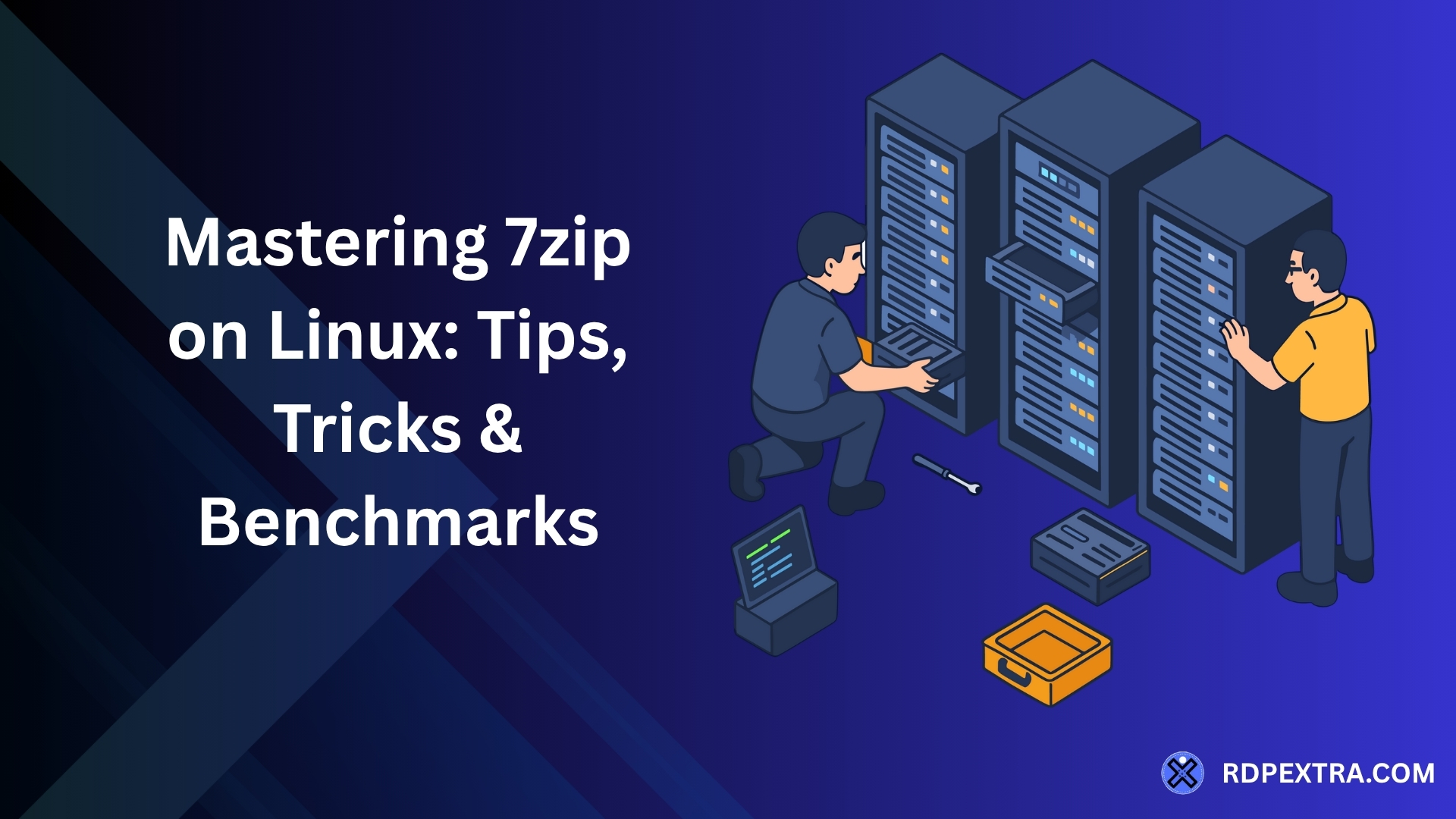

Mastering Seven Zip on Linux: Tips, Tricks, and Benchmarks for Smarter Compression
If you’ve ever run out of disk space on your linux rdp server, or waited painfully long for a massive file transfer to finish, you already know how critical compression tools are. Enter 7zip on Linux — a lightweight but powerful archiver that can help you compress smarter, transfer faster, and secure your data with minimal effort 7zip linux linux rdp seven zip linux.
This guide isn’t just theory. It’s a hands-on resource designed for two types of users:
- CLI Lovers (Admins/Devs/Power Users): who want to script, automate, and optimize.
- GUI Users (7zip ubuntu/Desktop Users): who prefer right-click menus and simple archive managers.
We’ll cover both worlds clearly, without mixing them. By the end, you’ll know not just how to use 7zip linux, but how to master it efficiently in your workflow.
What is 7zip on Linux?
Seven zip linux is a file archiver famous for its high compression ratio using LZMA/LZMA2 algorithms. On linux rdp, you’ll most often use its port, p7zip linux, which brings the .7z format and utilities like 7z, 7za, and 7zz.
- Compression algorithms supported: LZMA, LZMA2, BZip2, Deflate, PPMd.
- Encryption: AES-256 with optional filename encryption.
- Formats supported: .7z, .zip, .tar, .rar (with extra package), .xz, and more.
- Cross-platform compatibility: archives can be opened on Windows, macOS, and Linux rdp.
Why it matters: Compared to traditional .seven zip linux or .tar.gz, 7zip often delivers 20–40% smaller file sizes, which saves bandwidth and storage — critical for backups, VM images, and remote file transfers.
Installing & Verifying 7zip on Ubuntu and Other Distros
For CLI users (terminal lovers):
On 7zip ubuntu/Debian:
sudo apt update && sudo apt install p7zip-full p7zip-rar
On Fedora/RHEL:
sudo dnf install seven zip linux p7zip-plugins
Verify installation:
7z –help
You should see a list of commands supported by the binary (7z, 7za, or 7zz depending on the package).
For GUI users (desktop-focused):
Most linux rdp desktop environments (GNOME, KDE) integrate 7zip linux automatically with their archive managers:
- GNOME (File Roller): install p7zip-full to enable 7z extraction/creation in right-click menu.
- KDE (Ark): same package, auto-integrated.
Tip: If you can’t see the option in your right-click menu, restart your session after installing the package.
👉 Micro-CTA: Want all installation commands and checks in one place? Download our quick-start 7zip Linux checklist here.
Benchmarks: 7zip vs ZIP vs tar.gz
Here’s a practical comparison (typical text/codebase dataset, 1.2 GB, tested on 7zip ubuntu 22.04, 4-core VM):
| Format | Size After Compression | Compression Time | Decompression Time | Notes |
| ZIP | 820 MB | 1m 22s | 12s | Fast, highly compatible |
| tar.gz | 710 MB | 2m 10s | 14s | Good balance, preserves permissions |
| 7z (LZMA2, level 5) | 640 MB | 2m 55s | 13s | Best ratio, slower compression |
Key takeaway: If disk space and bandwidth matter more than speed, use .7z. For faster, universal compatibility, seven zip linux or tar.gz is fine.
12 Practical Tips & Tricks
Here’s where you turn knowledge into efficiency.
1. Pick the right format
- Use .7z for maximum compression.
- Use .zip for cross-platform compatibility (e.g., sharing with Windows users).
2. Balance speed vs size
- Compression level 5 is a sweet spot.
- Avoid level 9 unless absolutely necessary — it may double CPU time for only ~2–3% smaller size.
3. Prefer LZMA2 for large archives
- Handles multi-core CPUs better.
- Especially useful for VM images, ISO files, and large code repositories.
4. Use “solid archives” for similar files
- Great for text/code directories.
- Caveat: slower when extracting single files.
5. Split archives for remote transfers (Linux RDP-friendly)
- -v2g creates 2GB chunks.
- Safer for unstable RDP or SSH sessions.
6. Always compress before transfer
- Moving 1,000 files individually kills speed.
- Archive first → transfer one file → extract.
7. Encrypt archives with AES-256
- Use -pPASSWORD -mhe=on to protect both contents and filenames.
- Critical for sensitive backups.
8. Exclude junk files
- Use -xr!*.tmp -xr!*.log to skip caches/temp files.
9. Always test archives before deleting sources
- 7z t archive.7z confirms integrity.
- Saves you from data loss nightmares.
10. GUI vs CLI: choose wisely
- GUI = quick, one-time tasks.
- CLI = automation, scripts, CI/CD pipelines.
11. Pick the right binary
- 7z: full-featured.
- 7za: standalone, fewer formats.
- 7zz: newer versions, sometimes faster.
12. Tune dictionary size & threads
- For modern CPUs: -mmt=on -md=32m for better parallelism.
- On low-memory servers: reduce dictionary size to prevent swapping.
👉 Micro-CTA: Grab our preset command cheatsheet with ready-to-use 7zip linux one-liners.
7zip vs Tar vs Gzip — Compression Comparison on Linux
| Tool | Compression Ratio | Speed | Best For |
| 7zip | ⭐⭐⭐⭐ High (up to 30–40% smaller than gzip) | Medium speed | Maximum space saving, large archives, cross-platform sharing |
| tar | ⭐⭐ Low (minimal compression) | Very fast | Packaging many files together, linux rdp-native backups |
| gzip | ⭐⭐⭐ Good (smaller than tar, larger than 7zip) | Fast | Quick compression of logs, backups, and web server files |
👉 Takeaway: If speed is critical, go with seven zip linux. If disk space is your priority, 7zip linux is the winner 7zip linux linux rdp seven zip linux.
Use Cases
- Backups: Encrypt + compress for long-term storage.
- CI/CD pipelines: Package artifacts efficiently.
- Linux RDP sessions: Split archives for predictable transfers.
- Cross-platform collaboration: Share .zip for compatibility, .7z for efficiency.
Troubleshooting Common Issues
- Archive won’t open: Check if both sender/receiver have the same 7zip linux version.
- Too slow on VPS: Reduce compression level, or use tar.gz for speed.
- Transfer failures: Split archives into chunks, or use rsync/SCP instead of dragging over RDP.
Final Thoughts — Smarter Compression, Less Hassle
Think of 7zip linux as your Swiss Army knife for file compression. 7zip linux linux rdp seven zip linux Whether you’re a sysadmin automating backups or a desktop user trying to free up space on 7zip ubuntu, learning the right tricks makes all the difference.
- CLI users: script it, tune it, automate it.
- GUI users: right-click, encrypt, transfer safely.
💡 Action step: Standardize your seven zip linux usage with our free Linux 7zip Checklist & Command Cheatsheet — save time, avoid mistakes, and get compression right the first time.
FAQs — Mastering Seven Zip on Linux
You can install 7zip on Linux using your package manager. For Ubuntu, run sudo apt install p7zip-full. Once installed, you can compress, extract, and manage files efficiently with both CLI and GUI tools.
7zip often provides higher compression ratios than tar or gzip. However, tar/gzip is faster for system backups. If you want maximum space-saving, use 7zip; if you need speed and native compatibility, tar/gzip works better.
Yes. On Ubuntu, install “p7zip” with a GUI archiving tool like File Roller. This lets you right-click to compress or extract archives, making 7zip simple for users who prefer not to use terminal commands.
Yes. You can compress large files with 7zip before transferring via Linux RDP. This reduces bandwidth usage and speeds up transfers, making it especially useful for remote workers or admins managing multiple Linux servers.
7zip supports multiple formats including 7z, ZIP, TAR, GZIP, BZIP2, and XZ. This flexibility makes it a great universal compression tool for Linux, whether you’re archiving files locally or preparing cross-platform file transfers.
